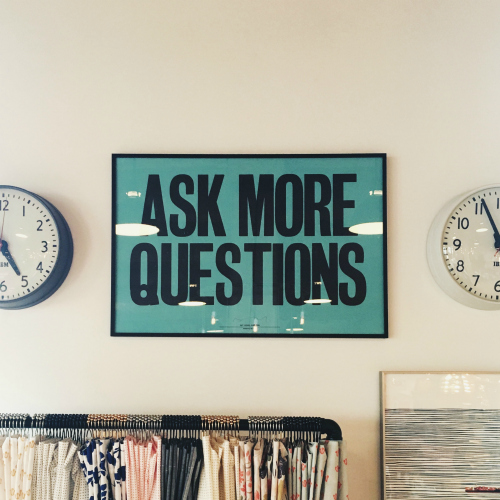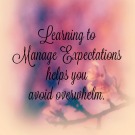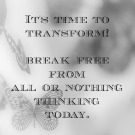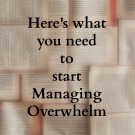You might have noticed I’ve been a bit obsessed with overwhelm lately and that’s because I not only see how exhausted it makes people, but also because I know it’s so easy to fall into the trap of feeling like there’s nothing you can do to get out of it. Luckily, that’s not true!
There’s an old saying about holes and that is when you’re in one stop digging. The best way to do that is to look at the part you’re playing. What are your expectations? What do you expect of yourself, of others, and the situation? Thinking about this isn’t meant to make you feel even worse about what you (think) you have on your plate, but is instead designed to help you see where you may be putting needless stress on yourself.
What do you expect from yourself?
One of the most deceptive and sneaky ways you can fall into overwhelm and self-sabotage is by placing unrealistic expectations on yourself. When you can’t see the light at the end of the tunnel, look at what you personally are trying to do. If it helps, write down all of what you think you should and must do and then ask yourself what would happen if you didn’t do each item on that list. Look for hidden expectations such as standards you feel you need to maintain (perfectionists beware – this will make you squirm). What will make you feel better right now and allow you to be satisfied with what you’ve accomplished? Mark items on your list that do not have to be done right now and either commit to doing them later or not doing them at all.
What do you expect of others?
One thing I am constantly working on with my own personal growth journey is noticing when I expect the same of others as I do of myself. As someone who has fairly high personal expectations, I often grow frustrated when others don’t seem to be as invested as I am about something. It’s during these times that I have to call an internal time out, step back, and try to understand why someone is perceiving a situation differently. And more importantly, I have to honor their perspective and try to work toward a solution, even if that solution means we don’t partner on a project or in essence, we “agree to disagree.” If you’re feeling frustrated with someone, ask yourself how you can look at the situation from their perspective, even if you don’t agree with their viewpoint. Are you expecting things from this person that they simply aren’t going to be able to give and if so, how can you work toward a solution while understanding their perspective better? Write down all the expectations you have for the other person and see if those expectations are actually their expectations, or expectations you think they “should” have.
What do others expect of you?
How do we form ideas on what others expect of us? I’d argue it’s a combination of our own personal expectations, past experiences with this person, our take on the current situation, and the ever dreaded assumptions. That’s right, more times than not, we assume what others expect, without actually clarifying. This ties in closely with what you expect of yourself and can be a huge source of unneeded stress for you. Instead of assuming what the other person expects from you, take the time to ask them. Set appropriate boundaries kindly but firmly, and work to find common ground. Again, if it helps, write down what you think the other person expects and then ask them about the top three items that are causing you the most anxiety. You may be surprised by their answers.
What do you expect from the situation?
Most of the time each of us go into a situation hoping for a certain outcome. We want to be chosen for the new job, we want our article to get published on that website, we’re attached to how we think something should turn out. But in all honestly, we’re never truly 100% in charge of how things go. When you find yourself in an overwhelming situation, step back and ask yourself what you expected to happen. What got you to where you are and how did that differ from what you thought would happen? Write out what you thought would happen and what actually happened as a sequence of steps or a numbered list of bullet points. Where are you most disappointed or frustrated and why? Is your disappointment or frustration due to the situation, a person in it, or both? How can you now reset expectations about this situation and make decisions about what you need to do next? How can you stay curious as to how the situation as it is now can lead you to something better?
One of the easiest ways to dump needless stress from your life is to get up close and personal with the expectations you have for yourself, others, and situations. By asking questions, appreciating other perspectives, and learning to reset expectations when things don’t go your way, you can better manage all you have to do and feel good at the end of the day.






